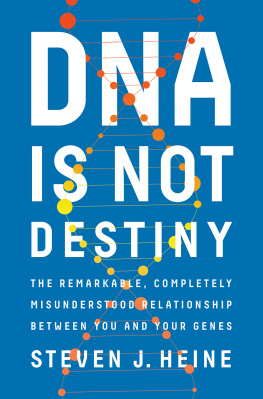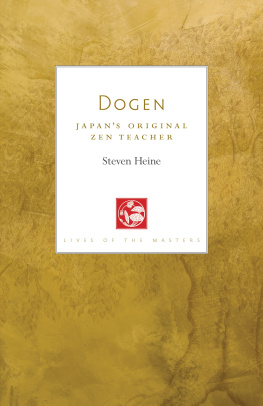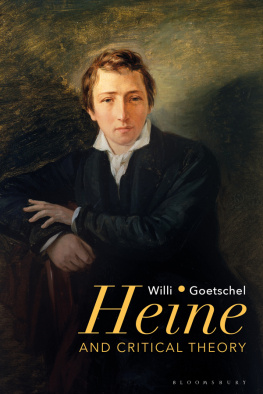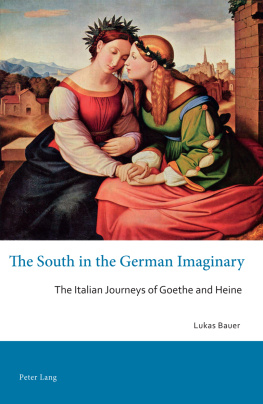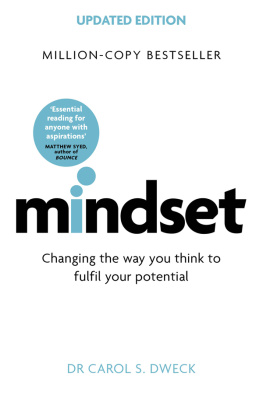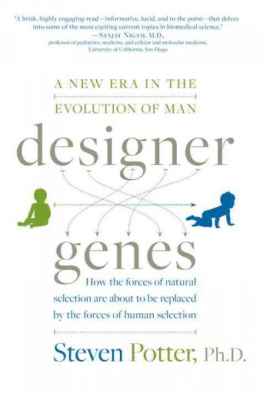

As with all big life tasks, this one emerged through a lot of collaboration, and Im indebted to the countless people who helped me with this book. First, I thank my grad students who helped me with the many studies that provided the backbone for this book, most notably Ilan Dar-Nimrod and Benjamin Cheung, as well as Wren Gould, Damian Murray, Cermet Ream, Matthew Ruby, and Anita Schmalor. Other students in the Culture and Self Lab were also instrumental along the way, both in talking with me about the ideas, and in providing feedback on chapters, with particular call-outs to Michael Muthukrishna and Dan Randles. Im also grateful to John Monterosso, who, as a graduate student at the University of Pennsylvania, first planted the seed of the idea of genetic essentialism in my head more than 15 years ago. A few lab managers also helped me hugely by tracking down an endless series of books, chapters, and newspaper articlesthanks to Adam Baimel, Colin Xu, and Brittany Hathaway. And Kokoro Research Centre in Kyoto provided the most inspiring environment to start working on this bookthanks in particular to Yukiko Uchida there.
I am especially grateful for having such a wonderful set of colleagues at the University of British Columbia, with whom Ive had the chance to talk about the ideas in this book, and about the world and human nature more generally. Whether those discussions were on a chair lift at Whistler, at a pub, or at our weekly workshop, I always learned a lot and felt inspired by their company. In particular, my buddies at the Human Evolution, Cognition, and Culture Centre, Mark Collard and Ted Slingerland, always gave me lots to think about, and my countless lunches with Joe Henrich and Ara Norenzayan especially helped in sharpening many of the ideas in this book. And Ive had many other stimulating conversations with my other brilliant colleagues in the Psychology Department, including Karl Aquino, Jeremy Biesanz, Sue Birch, Frances Chen, Liz Dunn, Todd Handy, Kristin Laurin, Mark Schaller, Toni Schmader, and Jess Tracy.
My graduate advisor, Darrin Lehman, got me started on being an academic, and he continues to help in so many ways, including by bringing together the collection of great minds at UBC. I wouldnt be here today without him.
The research I report in this book was all funded by the Social Sciences and Humanities Research Council of CanadaIm grateful for all the support that Ive received throughout my career.
This book has benefitted enormously from many colleagues and friends who read and provided feedback on chapters along the way, including Coren Apicella, Michael Coughtrie, Joe Henrich, Matt Lorinz, Dick Nisbett, Wendy Roth, Laura Specker-Sullivan, Vanessa Silva, Eric Turkheimer, and Carles Vilarino-Guell. I also learned much from discussions with Jehannine Austin, David Dobbs, Adam Frankl, Anna Lehman, and Corey Nislow. My original proposal received some sage guidance and writing tips from Jon Haidt and Ethan Watters.
Im particularly indebted to my agent, Max Brockman, who somehow saw the potential for a book in my proposal. And my editor at Norton, Jeff Shreve, contributed hugely in making this book a more accessible and compelling readthanks, Jeff, for the many drafts with all of your helpful encouragement along the way.
And of course, thanks to Christine, for supporting and inspiring me through this all. My kids, Seiji and Kokoro, always delight me in letting me see firsthand how genes and experiences can combine so amazingly.
To my parents.
Thanks for the genes and the experiences.
Copyright 2017 by Steven J. Heine
All rights reserved
First Edition
For information about permission to reproduce selections from this book,
write to Permissions, W. W. Norton & Company, Inc.,
500 Fifth Avenue, New York, NY 10110
For information about special discounts for bulk purchases, please contact
W. W. Norton Special Sales at specialsales@wwnorton.com or 800-233-4830
Book design by Lovedog Studio
Production manager: Julia Druskin
JACKET DESIGN BY PETE GARCEAU
JACKET ILLUSTRATION ISTOCK / GETTY IMAGES
ISBN: 978-0-393-24408-3
ISBN: 978-0-393-24409-0 (e-book)
W. W. Norton & Company, Inc.
500 Fifth Avenue, New York, N.Y. 10110
www.wwnorton.com
W. W. Norton & Company Ltd.
15 Carlisle Street, London W1D 3BS
IN THE SECOND WEEK OF APRIL 2003, OUR world changed forever: we sequenced the first complete human genome.
We now have access to information about ourselves that no previous generation has ever had: we can peer directly into our own genetic makeup. We each have a unique string of nucleotides in our cells that contributes to who we are, and since that fateful week in 2003, we are able to unravel this string and read it. Its a 6-billion-letter autobiographical code that seemingly flows straight from the pen of God. Our genome contains deep secrets about us: where our ancestors came from, which diseases well likely avoid and which ones might kill us, and what kinds of physical and psychological attributes were predisposed to have. This remarkable scientific revolution seems to provide us with nothing short of a window into our souls.
It is hard not to be both excited and frightened about the vast
Moreover, our knowledge of the human genome can be used as a nearly ironclad means to identify individuals. For example, the popular crime drama CSI: Crime Scene Investigation was based on the premise that crime scenes were riddled with invisible traces of DNA that unambiguously identified all who were involved. Indeed, this plays out in real court cases that depend on DNA testing to identify the perpetrators. Sometimes this endeavor can get taken to absurd ends, such as the Hong Kong Cleanup Initiative, which promises to collect DNA traces from litter to create a picture of the litterers face, to publicly identify and shame him or her. The same logic has been exploited by PooPrints DNA testing kits, which promise to identify delinquent dog owners who have failed to clean up after their pet.
Our genes can also tell us long lost tales about who our ancestors were, and where they likely came from, based on similarities between our own genomes and those of people living around the world. And the ability of genome sequencing to identify peoples ancestry and personal history has even been extended to those long since gone; for example, scientists have read the genetic script of a Neanderthal man who lived approximately 38,000 years ago, from DNA in his remains. Our genes seem to stand as a nearly permanent record of our life and the lives of our predecessors.
The genomic revolution promises to completely upend our understanding of the world. And with the advent of direct-to-consumer genetic testing companies, such as 23andMe, you can now affordably get yourself genotyped. What will you do when you learn about the genetic secrets of your own life? My bet is that youre going to respond in all the wrong ways.
This is not because of any specific genes that you might learn about, but because of the psychological machinery in your brain which influences how you think about genes. We come equipped with a set of psychological biases that ascribe almost mystical powers to our genes. These biases can lead to racism, sexism, or eugenics, but they can also foster tolerance for others, sympathy, and potential for progress. Were going to explore how these psychological biases work, how they make us vulnerable to the massive hype surrounding the genomic revolution, and how we can corral them into more effective ways of thinking.
Next page
